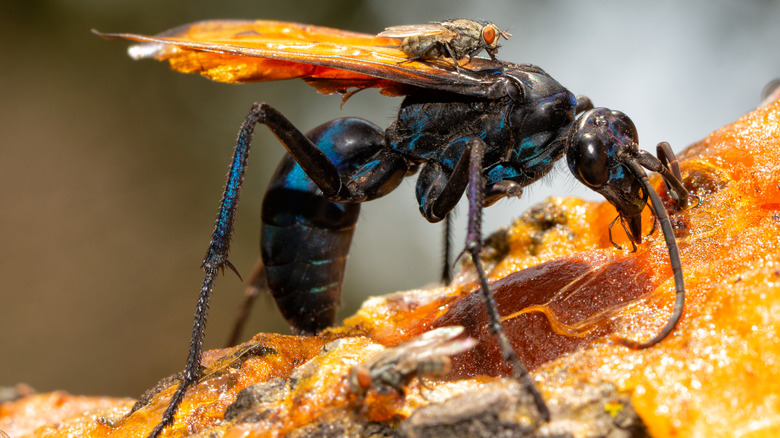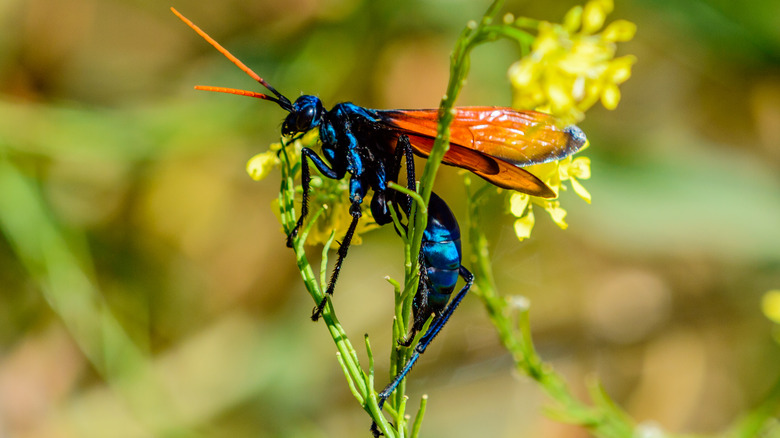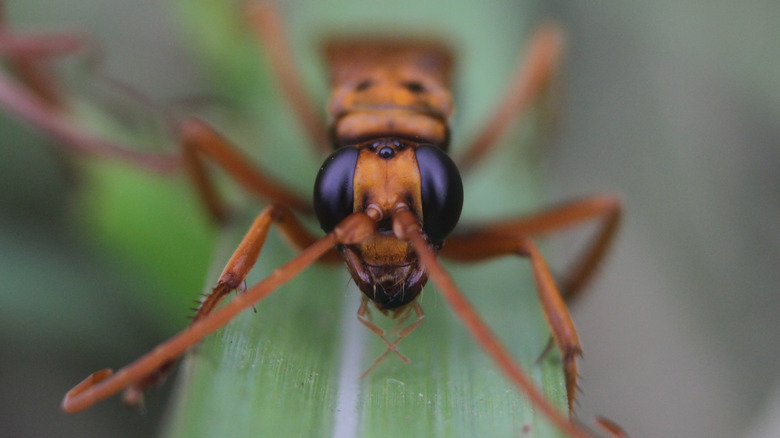The Bizarre Thing You Should Do If Stung By A Tarantula Hawk Wasp
When it comes to bites and stings, the animal kingdom really does have a whole smorgasbord of pain to offer. Some creatures' bites can't even be felt by humans at all, and others cause mild itching or irritation at best. Then there are those animals that have a wildly different impact from one human to another.
As Healthline reports, the sting of a wasp can cause significant pain, but the effects often begin to fade away within hours. Those with severe allergic reactions to the venom of a wasp, however, can expect far worse. In extreme cases, anaphylaxis can set in so quickly and so dangerously that a wasps' sting can be fatal.
Healthline states that an EpiPen can be used in such cases, to address the shock and associated symptoms that the stung person's body is experiencing. In the case of the formidable tarantula hawk wasp, though, a sting is a harrowing experience for all concerned, and one recommendation for easing the pain is rather unconventional.
The tarantula hawk wasp, with some of the most fearsome creatures in the animal kingdom in its name, is clearly one tough and terrifying customer. As the National Park Service reports, the species "pepsis thisbe" can reach two inches long and is common in the area of the Grand Canyon, where it has ready access to its prey: tarantulas.
A tarantula's very worst enemy
Hunting tarantulas is no mean feat for any two-inch-long creature, but female tarantula hawk wasps will incapacitate the spiders and transport them to their nests, to become living food supplies for the larvae, per National Park Service. This battling wasp, then, has some extreme firepower on its side.
According to the Natural History Museum, the Schmidt sting pain index was derived by insect expert Jason Schmidt, as a way to categorize the venom of various insects. In his own words, he describes the bite of the red fire ant, low on the scale, as merely "mildly alarming ... like walking across a shag carpet and reaching for the light switch." This is pain level one on the scale. Weighing in at pain level four, meanwhile, is the tarantula hawk wasp. This venom, per Schmidt, feels as though "a running hair dryer has just been dropped into your bubble bath."
Dr. Gavin Broad of the Natural History Museum states that the tarantula is left completely immobile for the rest of its agonizing life and that, even without the whole being-eaten-alive dilemma it faced, "it would remain in a state of suspended animation for quite a while, until eventually its respiration would stop."
What, then, can unfortunate humans do if they're on the receiving end of this mighty insect's venom? In his book "The Sting of the Wild," Schmidt simply writes "stung by a tarantula hawk? The advice I give in speaking engagements is to lie down and scream."
Humans are also affected in a terrible, scream-inducing way
It may sound silly, but there's logic behind this suggestion. Justin Schmidt goes on to explain in "The Sting of the Wild," that screaming is satisfying and helps reduce attention to the pain of the sting." Lying down will also prevent the stung person from blundering or flailing around in a super sore haze and, by so doing, surely manage to harm themselves further. There's a silver lining here for us, though. Unlike a doomed tarantula, humans are not affected for very long by the pain.
In the abstract of his paper "Venom and the Good Life in Tarantula Hawks (Hymenoptera: Pompilidae): How to Eat, Not be Eaten, and Live Long" from the Journal of the Kansas Entymlogical Society (via JSTOR), Schmidt states that "Tarantula hawks produce large quantities of venom and their stings produce immediate, intense, excruciating short term pain in envenomed humans."
As Schmidt continues to explain in his book that the species is actually reliant on its prey to survive. It wants to incapacitate tarantulas, not kill them, which is why its venom works in this very interesting (and horrifying) way. Human beings, in their turn, will tend to be reduced to a screaming, pain-laden state by an attack. Not for very long, though, it seems. So that's nice.


